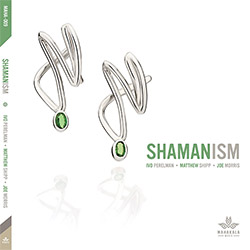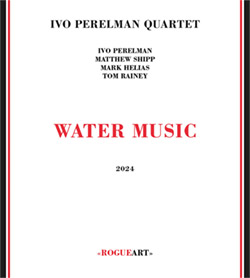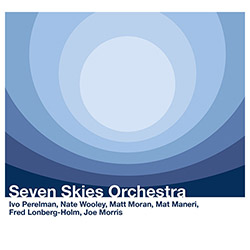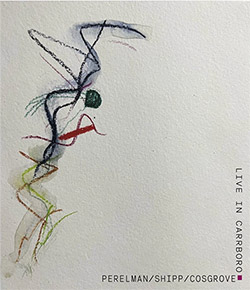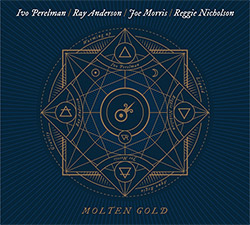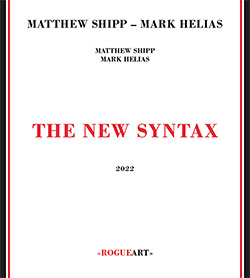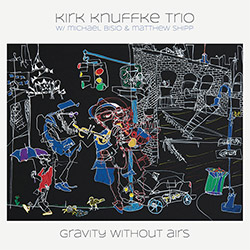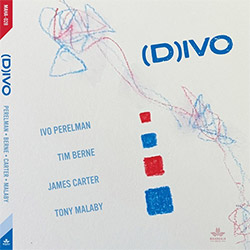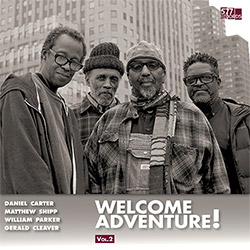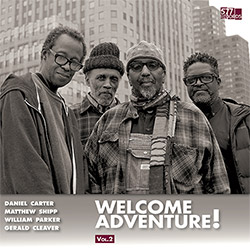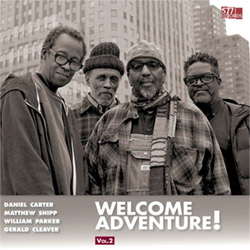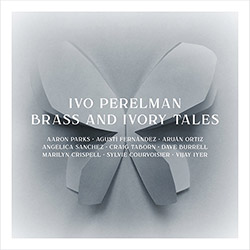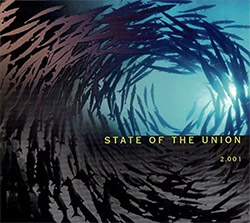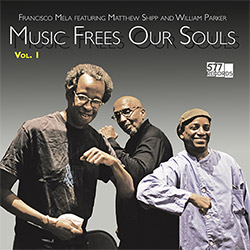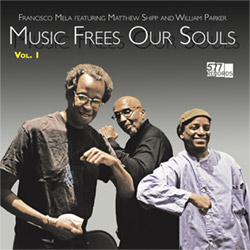![Perelman, Ivo / Matthew Shipp: Oneness [3 CDs] (Leo Records) Perelman, Ivo / Matthew Shipp: Oneness [3 CDs] (Leo Records)](https://www.teuthida.com/productImages/misc4/25815.jpg)
A significant release culminating the partnership of saxophonist Ivo Perelman and pianist Matthew Shipp, a distillation of their work after 8 duo recordings and dozens of collaborative albums, this 3 CD presents their work together in nearly telepathic terms: sympathetic and intimate without irascibility, a beautiful and introspective reflection of a shared ethic.
In Stock
Quantity in Basket: None
Log In to use our Wish List
Shipping Weight: 8.00 units
Sample The Album:
Ivo Perelman-tenor saxophone
Matthew Shipp-piano
Click an artist name above to see in-stock items for that artist.
UPC: 5024792082322
Label: Leo Records
Catalog ID: LEOR823.2
Squidco Product Code: 25815
Format: 3 CDs
Condition: New
Released: 2018
Country: UK
Packaging: Jewel Tray Box w/ 3CDS
Recorded at Parkwest studios, in Brooklyn, New York, in September 2017, by Jim Clouse.
"Triple CD deluxe edition represents five days of recordings in the studio. The front cover of this magnificent box depicts the Ouroboros, the serpent or snake eating its own tail. This image exists in many cultures throughout human history where it has come to represent unity, as in the meeting of two minds. Perelman and Shipp went to the studio for five days in a row with the idea to record and then to choose the best takes to make one CD. But when they listened to the playback they could not choose the best pieces. That's why they have decided to release this triple CD with the title Oneness."-Leo
"The depth-defying duo, tenor saxophonist Ivo Perelman and pianist Matthew Shipp, attain their zenith with the new release Oneness (March 2 on Leo Records). This three-CD set, recorded over a five-day period, marks the apotheosis of the Perelman-Shipp duo recording career - at least for now. While they will perform in concert, and may return to the studio at some point, they have no immediate plans for follow-up albums in this most intimate of formats.
"This is it," Perelman stated shortly after completing work on this boxed set. "I can't see us making another duo recording in the near future. The process was so intense. . . for now, there's nothing more to say."
That seems unlikely in the long run, if only because these two musicians have already said so much without repeating themselves. During an artistic alliance that stretches back more than 20 years, Perelman and Shipp - from Sao Paulo, Brazil and Wilmington, Delaware, and born only a few weeks apart - have released eight previous discs as a pair; they have also performed together, in various formats with other musicians, on another 30-odd albums. During the last decade especially, their interactions have achieved an uncanny connection that compares with other sparkling examples of jazz telepathy, from Louis Armstrong and Earl Hines to John Coltrane and McCoy Tyner - a "Oneness" represented on the album cover by the Ouroboros, an ancient depiction of a snake eating its own tail.
Found in many cultures, the Ouroboros symbolizes infinity and the cyclical nature of life. But it also symbolizes unity, as in the meeting of two minds - a rare occurrence that Shipp recognized the first time he and Perelman played together in 1996. "I can remember feeling a connection at that very first session, like this was something that was meant to be," the pianist recently told JAZZIZ Magazine. As further explanation of this phenomenon, Shipp describes "the third mind," a term popularized by William S. Burroughs and poet Brion Gysin to convey the idea "that whenever you have two minds working together, there's a third, superior mind, a gestalt between the two that arises." (Indeed, one suspects that if technicians were to map Perelman's and Shipp's brainwaves during any given performance, the areas of overlap would defy medical science.) "And that really does seem to happen to us a lot of the time."
It happens often enough that, for Oneness, they sought to distill this "third mind" into a single CD's worth of recordings, a concept that had discussed for several years, and had even attempted on one or two previous occasions. By digging ever more deeply into this "third mind" during nearly a week devoted to nothing else, they hoped to make Oneness a carefully selected culmination of their duet work up till now by. "The idea was to get just one CD, the best of the very best," Perelman explained. But they outdid themselves. As Perelman explains: "When we listened back to the recordings we said, 'We can't choose.' So, we have to release these three CDs."
The individual performances traverse the usual range of emotions that arise when these two artists explore the shared space between them, but even more so; in Perelman's words, "It's what it was, but at a higher degree." There's the heart-racing thrill of their eddying flights to the stratosphere, led by Perelman's preternatural command of the altissimo register, and the heart-rending sweetness of soft, pure passages, buoyed by liquidy ostinatos at the piano; the disruptive intoxication that results when Shipp uses neo-baroque figures to inspire equally modern/ancient flurries from the saxophone; the unexpected serenity of long lines that traverse several octaves in a wink, and the galvanizing power that erupts when guttural tenor blasts fuse with densely chorded piano pillars.
But relying on any one of these individual performances to the exclusion of others fails to validate the album's concept - or, for that matter, the Duo's history and presence. And perhaps their wish to declare any one set of performances as the pinnacle of its work is, at best, quixotic. "Maybe one day we'll go and actually get the very best of the very best," Perelman mused. "Other than that, I think we accomplished our mission."
All good things must come to an end, and few phases conclude as convincingly as Oneness, the Perelman-Shipp Duo's valedictory statement on disc - at least, for now.
About Ivo Perelman
Growing up in São Paulo, Ivo Perelman was a classical guitar prodigy who sampled a series of other instruments before finally adopting the tenor saxophone. At the Berklee College of Music, he concentrated on the mainstream masters of the tenor sax, as opposed to such pioneering avant-gardists as Albert Ayler, Peter Brötzmann, and John Coltrane (all of whom would later be cited as precedents for his music). Perelman left Berklee in 1983 and moved to Los Angeles, where he discovered his penchant for post-structure improvisation and, inspired by the freedom afforded by this approach, he started investigating the free-jazz saxophonists who had come before him; eventually, he began moving toward the goal of "complete spontaneity," improvising music with no predetermined theme, structure, or tempo. In the early 90s he moved to the more inviting artistic milieu of New York, where he maintains an apartment while spending about half his time in São Paulo; there he focuses on his separate career as a visual artist, producing a steady stream of abstract drawings and paintings that have attracted admirers worldwide. Many of these works show the same vivacious, kinetic expressionism that animate his music, which he has documented on more than 80 recordings under his own name.
About Matthew Shipp
Matthew Shipp, who has released close to 70 albums under his own name - in addition to those on which he shares co-billing with Perelman (and the several dozen albums where he appears as a sideman) - has played piano since the age of 6. After a year at University of Delaware and another at Berklee, he moved to New York in 1984, and in 1991 he joined the power free-jazz quartet led by saxophonist David S. Ware, with whom he toured widely and recorded more than 20 albums. In Ware's band, Shipp's early love of rock music - and his ability to infuse rock's energy into a free-jazz context - stood him in good stead; also in Ware's band, he established a lasting bond with the titanic bassist William Parker and drummer Whit Dickey, both of whom have worked with him and Perelman on subsequent albums. A furiously eclectic iconoclast, Shipp can careen from compositions rooted in his classical studies, to the Great American Songbook, to hip-hop in a matter of measures, tying these disparate idioms together with an overarching sense of the music's history and its future. His openness to electronics and new idioms led him to become curator for the Thirsty Ear label's "Blue Series" in the early 2000s."-DL Media
Artist Biographies
• Show Bio for Ivo Perelman "Born in 1961 in São Paulo, Brazil, Perelman was a classical guitar prodigy who tried his hand at many other instruments - including cello, clarinet, and trombone - before gravitating to the tenor saxophone. His initial heroes were the cool jazz saxophonists Stan Getz and Paul Desmond. But although these artists' romantic bent still shapes Perelman's voluptuous improvisations, it would be hard to find their direct influence in the fiery, galvanic, iconoclastic solos that have become his trademark. Moving to Boston in 1981, to attend Berklee College of Music, Perelman continued to focus on mainstream masters of the tenor sax, to the exclusion of such pioneering avant-gardists as Albert Ayler, Peter Brötzmann, and John Coltrane (all of whom would later be cited as precedents for Perelman's own work). He left Berklee after a year or so and moved to Los Angeles, where he studied with vibraphonist Charlie Shoemake, at whose monthly jam sessions Perelman discovered his penchant for post-structure improvisation: "I would go berserk, just playing my own thing," he has stated. Emboldened by this approach, Perelman began to research the free-jazz saxists who had come before him. In the early 90s he moved to New York, a far more inviting environment for free-jazz experimentation, where he lives to this day. His discography comprises more than 50 recordings, with a dozen of them appearing since 2010, when he entered a remarkable period of artistic growth - and "intense creative frenzy," in his words. Many of these trace his rewarding long-term relationships with such other new-jazz visionaries as pianist Matthew Shipp, bassists William Parker, guitarist Joe Morris, and drummer Gerald Cleaver. Critics have lauded Perelman's no-holds-barred saxophone style, calling him "one of the great colorists of the tenor sax" (Ed Hazell in the Boston Globe); "tremendously lyrical" (Gary Giddins); and "a leather-lunged monster with an expressive rasp, who can rage and spit in violence, yet still leave you feeling heartbroken" (The Wire). Since 2011, he has undertaken an immersive study in the natural trumpet, an instrument popular in the 17th century, before the invention of the valve system used in modern brass instruments; his goal is to achieve even greater control of the tenor saxophone's altissimo range (of which he is already the world's most accomplished practitioner). Perelman is also a prolific and noted visual artist, whose paintings and sketches have been displayed in numerous exhibitions while earning a place in collections around the world." ^ Hide Bio for Ivo Perelman • Show Bio for Matthew Shipp "Matthew Shipp was born December 7, 1960 in Wilmington, Delaware. He started piano at 5 years old with the regular piano lessons most kids have experienced. He fell in love with jazz at 12 years old. After moving to New York in 1984 he quickly became one of the leading lights in the New York jazz scene. He was a sideman in the David S. Ware quartet and also for Roscoe Mitchell's Note Factory before making the decision to concentrate on his own music. Mr Shipp has reached the holy grail of jazz in that he possesses a unique style on his instrument that is all of his own- and he's one of the few in jazz that can say so. Mr. Shipp has recorded a lot of albums with many labels but his 2 most enduring relationships have been with two labels. In the 1990s he recorded a number of chamber jazz cds with Hatology, a group of cds that charted a new course for jazz that, to this day, the jazz world has not realized. In the 2000s Mr Shipp has been curator and director of the label Thirsty Ear's "Blue Series" and has also recorded for them. In this collection of recordings he has generated a whole body of work that is visionary, far reaching and many faceted." ^ Hide Bio for Matthew Shipp
4/24/2024
Have a better biography or biography source? Please Contact Us so that we can update this biography.
4/24/2024
Have a better biography or biography source? Please Contact Us so that we can update this biography.
Track Listing:
CD1
1. Part 1 4:16
2. Part 2 4:34
3. Part 3 1:15
4. Part 4 6:33
5. Part 5 3:32
6. Part 6 5:18
7. Part 7 6:01
8. Part 8 3:31
9. Part 9 5:38
10. Part 10 4:06
11. Part 11 4:23
CD2
1. Part 1 5:32
2. Part 2 5:26
3. Part 3 7:34
4. Part 4 4:18
5. Part 5 5:00
6. Part 6 4:16
7. Part 7 5:10
8. Part 8 4:25
9. Part 9 3:45
10. Part 10 3:23
CD3
1. Part 1 4:49
2. Part 2 6:10
3. Part 3 2:05
4. Part 4 2:37
5. Part 5 3:07
6. Part 6 3:51
7. Part 7 4:2
3 8. Part 8 2:24
9. Part 9 2:45
10. Part 10 3:59
11. Part 11 2:45
12. Part 12 4:36
Improvised Music
Jazz
Free Improvisation
NY Downtown & Metropolitan Jazz/Improv
Duo Recordings
Leo Records
Melodic and Lyrical Jazz
Staff Picks & Recommended Items
Last Copy of Items that will not be restocked...
Search for other titles on the label:
Leo Records.


![Perelman, Ivo / Matthew Shipp: Oneness [3 CDs] (Leo Records) Perelman, Ivo / Matthew Shipp: Oneness [3 CDs] (Leo Records)](https://www.teuthida.com/productImages/full/25815.Full.jpg)

